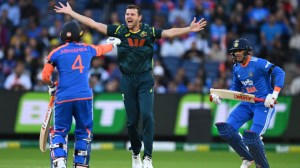Stay updated with the latest - Click here to follow us on Instagram
02 riots: Protection cell receives first complaint of witness intimidation
The Witness Protection Cell (WPC),which was set up by the Supreme Court-appointed Special Investigation Team (SIT) about a fortnight ago,received the first complaint of intimidation to a key witness of the 2002 riots on Thursday.
The Witness Protection Cell (WPC),which was set up by the Supreme Court-appointed Special Investigation Team (SIT) about a fortnight ago,received the first complaint of intimidation to a key witness of the 2002 riots on Thursday.
Firoz Khan Pathan,a witness in the Gulberg Society massacre case of February 28,2002,called up at the WPC 24X7 helpline number in the morning and lodged a complaint about criminal intimidation by an unidentified person.
State Reserve Police Commandant M V Damor,in-charge of WPC,said: This was the first complaint of intimidation to a witness in the nine Gujarat riot cases that the SIT is investigating.
WPC officials immediately swung into action and Deputy Superintendent of Police J M Suthar,the investigating officer of the Gulberg Society case,was intimated. He,in turn,called up Pathan and asked him to lodge a complaint with the Karanj police station.
Pathan alleged in his complaint that an unidentified person called him up from a local telephone number,22160261 and threatened him of dire consequences for having named VHP leader Atul Vaidhya and Mahesh Nath,a resident of Gulberg area,in his statements before the SIT.
The complaint further said that the unidentified caller also threatened to kill Asif Malek,an SRP personnel deployed for Pathans security.
Karanj Inspector K S Savani said: We have registered a complaint under Section 507 of the IPC (criminal intimidation by anonymous communication),and investigations are underway.
Another issue to be raised at the meeting is that the states,which contribute more to the Centres kitty through the collection of various taxes,are not being given any weightage in the allocation of resources.
Although Gujarat contributes about Rs 50,000 crore per annum to the Central taxes,the state gets only Rs 5,000 crore as per the 12th Finance Commission formula.
Shelat said the present distribution of resources between the Centre and states is not in line with the development expenditure incurred by the two.
At present,nearly 60 per cent of the development expenditure is incurred by all the states put together. However,the states get only 40 per cent of the total national resources. The present distribution is skewed, he said,adding that the 12th Finance Commissions formula of giving only 30.5 per cent of the gross tax revenue to states should be revised upward to 50 per cent.
The government will also seek specific grant of Rs 15,000 crore to control salinity ingress in coastal areas of the state,Rs 10,000 crore for tribal area development,Rs 1,500 crore for border and coastal security and Rs 3,000 crore for the health sector.
The Commission will also be asked to compensate Gujarat with Rs 3,000 crore the amount it loses in the excise duty for implementing the prohibition policy.
The government will also request them to provide viability gap funding of Rs 12,000 crore for the public-private partnership (PPP) projects to be undertaken for the Delhi-Mumbai Industrial Corridor (DMIC) project,which relate to creating road,rail,ports and urban development infrastructure.







